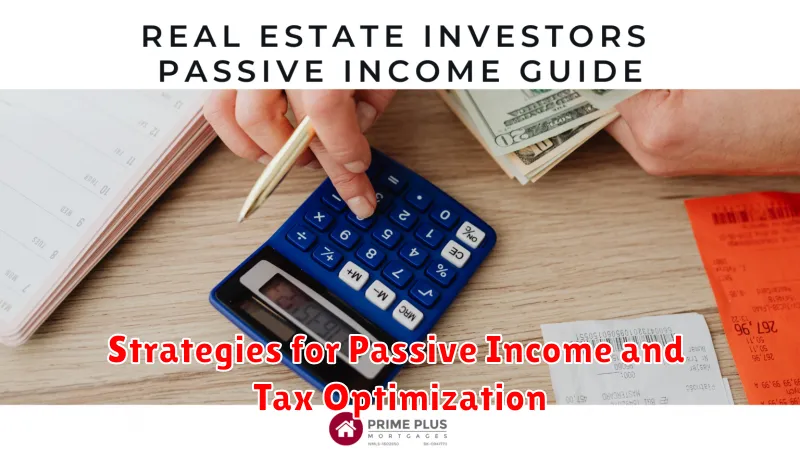Are you a real estate investor looking to maximize your returns and minimize your tax burden? Look no further! This comprehensive guide will equip you with the top tax strategies that savvy investors utilize to keep more of their hard-earned profits. From understanding depreciation deductions to leveraging tax-advantaged accounts, we’ll delve into the nuances of real estate taxation to help you make informed decisions and optimize your financial success.
Navigating the complexities of real estate taxes can be daunting, but it doesn’t have to be. By taking advantage of these powerful tax strategies, you can significantly reduce your tax liability, reinvest your savings into future ventures, and accelerate your path to financial freedom. Let’s dive into the world of real estate tax optimization and unlock the secrets to maximizing your returns!
Understanding Capital Gains and Depreciation
As a real estate investor, understanding capital gains and depreciation is crucial for maximizing your returns and minimizing your tax liability. Capital gains refer to the profit you make when you sell a property for more than you paid for it. This profit is taxable income, and the tax rate varies depending on how long you’ve owned the property.
On the other hand, depreciation is a tax deduction that allows you to deduct a portion of the cost of your rental property each year. This deduction is based on the assumption that your property is wearing down over time. While you can’t actually deduct the cost of the land, you can deduct the cost of the building, fixtures, and other improvements.
Understanding both of these concepts is essential for making informed investment decisions. By knowing how these factors impact your taxes, you can optimize your investment strategy and potentially save money on your tax bill.
Utilizing 1031 Exchanges for Tax-Deferred Growth
The 1031 exchange, also known as a like-kind exchange, is a powerful tax strategy that allows real estate investors to defer capital gains taxes when selling an investment property and reinvesting the proceeds into a new, similar property. This strategy can significantly enhance your long-term returns by allowing you to reinvest your capital without incurring immediate tax liabilities.
Here’s how it works: When you sell an investment property, you have a certain amount of time to identify and acquire a replacement property. The IRS guidelines are specific regarding the timeline and qualifying properties. You can exchange your existing property for one or more properties, as long as they meet the “like-kind” criteria. This typically means they must be similar in nature, such as a rental property for another rental property or a commercial property for another commercial property.
The key benefit of a 1031 exchange is that you can defer the capital gains tax on the sale of your property. This means that you don’t have to pay taxes on the profit until you eventually sell the replacement property. This can be particularly beneficial if you’re planning to continue investing in real estate for the long term. By deferring taxes, you can reinvest your capital and continue to grow your portfolio.
However, it’s crucial to remember that the 1031 exchange is a complex strategy with strict rules and regulations. You must work with experienced professionals, such as a qualified 1031 exchange intermediary, to ensure that the transaction meets all legal requirements. They will guide you through the process, handle the identification and acquisition of replacement properties, and ensure that the exchange is completed within the designated timeframe.
The Power of Opportunity Zones
Opportunity Zones are a powerful tool for real estate investors seeking to maximize their returns while contributing to economic development. Established by the Tax Cuts and Jobs Act of 2017, these designated areas offer significant tax benefits to investors who reinvest capital gains into qualified projects within the zones. By investing in Opportunity Zones, you can defer paying capital gains taxes, potentially reduce your overall tax liability, and even eliminate taxes entirely on long-term investments.
The allure of Opportunity Zones lies in their potential to unlock significant tax advantages. When you reinvest capital gains into an Opportunity Zone fund or business, you can defer paying capital gains tax until the earlier of the following: 1) December 31, 2026, or 2) the date you sell your investment. This deferment gives you valuable time to grow your investment and potentially reinvest it further.
Beyond deferral, Opportunity Zones offer even greater tax benefits. If you hold your investment in the Opportunity Zone for at least 10 years, you may be eligible for a substantial tax reduction. A portion of your capital gains can be permanently excluded from taxation, effectively reducing your overall tax liability. This powerful incentive makes Opportunity Zones a particularly attractive option for long-term investors aiming to build lasting wealth while contributing to economic growth.
Deductible Expenses for Real Estate Investors
Real estate investing can be a lucrative venture, but it’s essential to understand the tax implications to maximize your returns. One of the most significant aspects of real estate tax planning is knowing which expenses are deductible. By carefully considering these deductions, you can lower your tax liability and increase your overall profitability.
Common Deductible Expenses
- Mortgage Interest: Interest paid on loans secured by your rental property is generally deductible.
- Property Taxes: Real estate taxes levied on your rental property can be deducted as well.
- Insurance Premiums: Premiums for property insurance, including hazard insurance, are deductible.
- Repairs and Maintenance: Expenses for repairs and maintenance that keep your property in good condition are deductible, but not improvements that increase the value of the property.
- Depreciation: This is a non-cash expense that allows you to deduct a portion of the cost of your rental property over its useful life. It’s important to consult with a tax professional for accurate depreciation calculations.
- Utilities: Expenses for utilities like water, gas, and electricity are deductible if they are related to the rental property.
- Advertising and Marketing: Costs associated with marketing your rental property are deductible.
- Management Fees: If you hire a property manager, their fees are deductible.
- Travel Expenses: You can deduct travel expenses associated with managing your rental property, including trips for inspections or meetings.
Keeping Accurate Records
It’s crucial to maintain meticulous records of all your expenses. This includes receipts, invoices, and other documentation. This will help you support your deductions during an audit and ensure that you are not missing out on any potential savings.
Consult a Tax Professional
Tax laws are complex and can change frequently. It’s wise to consult with a qualified tax professional to discuss your specific situation and ensure that you are taking advantage of all applicable deductions. They can provide personalized advice and help you develop a sound tax strategy that minimizes your liability and optimizes your investment returns.
Depreciation Strategies to Reduce Tax Liability
Depreciation is a powerful tool for real estate investors to reduce their tax liability. It allows you to deduct the cost of your investment property over time, lowering your taxable income and ultimately saving you money. Here’s how depreciation works and how to maximize its benefits:
What is Depreciation? Depreciation is the process of deducting the cost of a tangible asset, such as a building or equipment, over its useful life. It recognizes that these assets wear down and lose value over time. For real estate, you can depreciate the building (excluding land) as it’s considered a depreciable asset.
Depreciation Methods:
- Straight-Line Depreciation: This method spreads the cost of the asset evenly over its useful life. It’s the simplest and most common method.
- Accelerated Depreciation: This method allows you to take larger deductions in the early years of the asset’s life. Examples include the Modified Accelerated Cost Recovery System (MACRS).
How Depreciation Affects Your Taxes:
- Lower Taxable Income: By deducting depreciation, you reduce your taxable income, resulting in lower tax payments.
- Increased Cash Flow: The tax savings from depreciation can increase your cash flow and allow you to reinvest in other properties.
Tips for Maximizing Depreciation:
- Accurate Valuation: Ensure you have an accurate appraisal to determine the depreciable basis of the property.
- Choose the Right Depreciation Method: Consult with a tax professional to determine the most beneficial depreciation method for your situation.
- Track Expenses: Keep meticulous records of all expenses related to the property, including repairs and improvements. These can affect depreciation calculations.
Important Notes:
- Land is Not Depreciable: Only the improvements on land (buildings, structures) are depreciable.
- Depreciation is a Deduction: It doesn’t mean you’re actually losing money; it simply reduces your tax liability.
- Recapture of Depreciation: When you sell a property, you may be required to recapture some of the depreciation you’ve claimed, resulting in a higher tax liability.
Depreciation can be a valuable tool for reducing your tax liability as a real estate investor. By understanding the principles of depreciation and utilizing appropriate strategies, you can maximize your tax savings and increase your overall return on investment.
Tax Benefits of Real Estate Investment Trusts (REITs)
Real Estate Investment Trusts (REITs) offer a compelling avenue for real estate investors seeking tax advantages. These publicly traded entities invest in and manage income-producing real estate, allowing investors to participate in the sector without the complexities of direct ownership.
One of the most significant tax benefits of REITs is their status as “pass-through” entities. This means that REITs distribute most of their taxable income to shareholders in the form of dividends, which are taxed at the individual investor’s level. This avoids double taxation, a common issue with traditional corporations.
REITs also provide opportunities for tax-sheltered growth. The dividends paid by REITs are often qualified dividends, which are taxed at a lower rate than ordinary income. Additionally, investors can potentially benefit from capital appreciation, as the value of REIT shares can increase over time.
Another key advantage is the tax-deductible depreciation. REITs can deduct depreciation on their real estate holdings, which can reduce their taxable income and potentially lead to greater after-tax returns for investors. However, it’s important to note that depreciation is a non-cash expense, meaning it doesn’t represent a real loss in value.
Investing in REITs can be a valuable strategy for savvy real estate investors looking to maximize their returns while navigating the complexities of real estate taxation. Consult with a financial advisor to determine if REITs align with your individual investment goals and risk tolerance.
Estate Planning and Tax Considerations
Estate planning is an essential part of real estate investing, ensuring your assets are distributed according to your wishes and minimizing potential tax burdens for your heirs. It involves creating a comprehensive plan that addresses issues such as:
- Will and Trust: Establishing a will or trust outlines how your real estate holdings will be passed on after your death.
- Beneficiary Designations: Designating beneficiaries for accounts like retirement funds and life insurance policies ensures assets are distributed as you intend.
- Durable Power of Attorney: Appointing a trusted individual to manage your financial affairs if you become incapacitated protects your assets.
- Healthcare Power of Attorney: Nominating someone to make healthcare decisions for you if you are unable to do so provides peace of mind.
By carefully planning your estate, you can potentially reduce estate taxes and ensure a smooth transition of your real estate holdings. Consider seeking guidance from an estate planning attorney to tailor a plan that fits your specific circumstances.
Navigating Property Tax Appeals
Property taxes can be a significant expense for real estate investors, but there are ways to minimize their impact. One effective strategy is to understand how to appeal property tax assessments. If you believe your property has been overvalued, you can challenge the assessment to potentially reduce your tax burden.
Here’s a step-by-step guide to navigating property tax appeals:
1. Understand the Assessment Process
The first step is to familiarize yourself with how your local government assesses property values. Every jurisdiction has its own appraisal methods and deadlines for appeals. You can find this information on your municipality’s website or by contacting the assessor’s office.
2. Gather Evidence
To strengthen your appeal, you need to provide compelling evidence that your property’s assessed value is too high. This can include:
- Recent appraisals from licensed professionals.
- Comparable sales data of similar properties in your area that have sold for lower prices.
- Documentation of property defects, such as damage or outdated features, that may affect its market value.
- Photos showcasing the condition of your property.
3. File a Formal Appeal
Once you have gathered your evidence, submit a formal appeal to the assessor’s office. Be sure to adhere to their deadlines and follow their specific instructions for filing. Include all relevant documentation and clearly articulate your reasons for challenging the assessment.
4. Be Prepared for a Hearing
In many jurisdictions, the assessor’s office will hold a hearing to review your appeal. Attend the hearing and present your evidence concisely and professionally. Be prepared to answer questions from the assessor or their representatives.
5. Consider Professional Assistance
If your appeal is complex or you’re unfamiliar with the process, consider hiring a professional property tax consultant. They can provide expert advice and representation throughout the appeal process.
Navigating property tax appeals can be a worthwhile endeavor for savvy real estate investors. By understanding the process, gathering strong evidence, and advocating for yourself, you can potentially save a significant amount of money on your property taxes.
Tax Implications of Short-Term Rentals

Short-term rentals, like those facilitated by platforms like Airbnb and Vrbo, have gained immense popularity as a lucrative investment avenue. While the potential for high returns is attractive, it’s crucial to understand the tax implications associated with this venture. This section will shed light on some key aspects of short-term rental taxation to help you navigate the financial landscape effectively.
Rental Income and Expenses: The income generated from short-term rentals is considered taxable income. This includes payments received from guests, as well as any additional fees or charges. On the other hand, you can deduct certain expenses directly related to your rental property, such as:
- Mortgage interest
- Property taxes
- Insurance premiums
- Utilities
- Repairs and maintenance
- Advertising and marketing expenses
- Cleaning supplies and services
Depreciation: You can also claim depreciation on your rental property, which is the decline in value over time. This allows you to deduct a portion of the property’s value each year, reducing your taxable income.
Homeowner’s Exclusion: For those who rent out a portion of their primary residence for less than 14 days, they may be able to utilize the homeowner’s exclusion. This allows you to exclude rental income from taxation if certain conditions are met.
State and Local Taxes: In addition to federal taxes, you may also be subject to state and local taxes on your rental income. These regulations vary by location, so it’s essential to consult with a tax professional familiar with your area’s specific rules.
Consult a Tax Professional: The tax landscape surrounding short-term rentals is complex and can vary based on individual circumstances. Consulting with a qualified tax professional can provide personalized guidance and ensure you’re taking advantage of all applicable deductions and credits.
Strategies for Passive Income and Tax Optimization

As a real estate investor, maximizing your returns requires a strategic approach to both passive income generation and tax optimization. Here are some effective strategies to achieve both:
Depreciation: Real estate investments allow for depreciation deductions on your property, which reduces your taxable income. By strategically utilizing this deduction, you can minimize your tax liability and increase your cash flow.
Homeownership Deductions: If you use a property as a rental, you can deduct expenses like mortgage interest, property taxes, insurance, and maintenance costs. These deductions can significantly reduce your taxable income.
Tax-Advantaged Investments: Consider investing in real estate through tax-advantaged accounts such as Roth IRAs or 401(k)s. These accounts can shelter your investment gains from taxes, allowing for long-term wealth accumulation.
1031 Exchange: This powerful strategy allows you to defer capital gains taxes when you sell a property and reinvest the proceeds into another investment property. This can help you build a larger portfolio without incurring immediate tax consequences.
Property Management: By hiring a professional property manager, you can potentially claim a deduction for their services. This reduces your taxable income and frees you from the day-to-day responsibilities of managing your rental properties.
Consult a Tax Professional: It’s crucial to consult with a tax professional to tailor your investment strategies and tax optimization plans based on your individual circumstances. They can guide you through the complexities of real estate taxation and help you maximize your tax benefits.
Working with a Qualified Tax Advisor

Navigating the complex world of real estate taxes can be daunting, even for seasoned investors. That’s why working with a qualified tax advisor is crucial to maximizing your returns and minimizing your tax liability. A good tax advisor can provide expert guidance on a range of tax strategies, including:
- Depreciation Deductions: Real estate investors can deduct a portion of their property’s value each year, reducing their taxable income.
- Capital Gains Tax Optimization: Understanding the nuances of capital gains tax and implementing strategies to minimize your tax burden is vital.
- Tax-Advantaged Investment Structures: A tax advisor can help you choose the most advantageous investment structures, such as LLCs or REITs, to optimize your tax situation.
- Deductible Expenses: A tax advisor can identify and track all deductible expenses related to your real estate investments, ensuring you claim everything you’re entitled to.
- Staying Updated on Tax Laws: Tax laws are constantly evolving, and a tax advisor can keep you informed of any changes that might impact your investments.
Beyond just tax preparation, a qualified tax advisor can serve as a valuable strategic partner, helping you make informed decisions that maximize your returns and minimize your tax liability. Remember, investing in expert advice can save you significant money in the long run.

